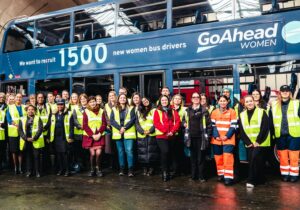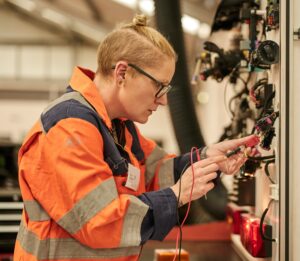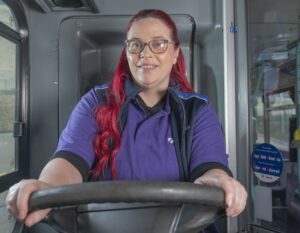
Given the UK automotive sector is taking major strides to improve its gender balance, such events are useful for road transport businesses and organisations to highlight the sector’s variety in roles – from driving and engineering to management and customer service – with the aim to encourage more women to consider them as a career.
For example, Go-Ahead Group has launched a new initiative to attract and recruit 1,500 new women drivers across its bus operations.
With the ‘Go-Ahead Women’ initiative, the company is embarking on a mission to achieve 50% gender equality by 2035.
According to recent data from Women in Bus and Coach, women make up 10% of the workforce in the bus industry.
At present, 11.5% of bus driver roles are occupied by women within Go-Ahead’s bus companies and the group is outlining its commitment on International Women’s Day to bridge this gender gap and to achieve true gender diversity by 2035.
In addition to the recruitment drive, new hires will benefit from a comprehensive eight-week fully paid training program, designed to equip them with the skills and confidence needed to excel in their roles.
Go-Ahead is also investing £8 million in upgrading bus depot facilities which includes better facilities for women.
Carolyn Ferguson, Chief People Officer for the Go-Ahead Group said: “We firmly believe that diversity drives innovation and success.
“We’re investing in training and development opportunities for women drivers, and by doing this we’re not only enriching our workforce but also paving the way for a more sustainable and inclusive future.”
Meanwhile, First Bus has committed to doubling the number of women in the business in the next five years.
Furthermore, in line with the FTSE Women Leaders recommendations, First Bus also aims to have 40% of senior leadership roles filled by women by 2028.
To reach this goal, First Bus is pledging that all senior hires – roles that are Staff Manager and above – in their first interview, will face a balanced panel of female and male interviewers.
First Bus, having successfully doubled the number of women in its business over the past five years, has also committed to a process that sees all senior hires have a 50:50 split at shortlist stage.
Janette Bell, Managing Director at First Bus, said: “Our ambition is that by 2028, 20% of our business will be made up of females. This would see us doubling the number of women in the business within the next five years, as we have done over the past five years.”
Also taking on this year’s theme of ‘Inspire Inclusion’ was bus and coach operator Stagecoach, collaborating with its internal Women’s Network to produce a video focussing on the journeys of its women employees that are leading the way in challenging stereotypes of the transport sector.
Featured in the video are a range of women from different areas of the business, and from engineering to commercial planning, the video examples the variety of opportunities available.
Stagecoach actively promotes diversity and inclusion in a variety of ways, from strategic objectives such as targeting 40% female leaders by 2026, through to its employee led networks.
Claire Miles, Chief Executive Officer, said: “Ensuring Stagecoach is an employer of choice by actively creating space for diversity and inclusion benefits not only Stagecoach but the wider transport sector.
“Targets such as these help Stagecoach to continue on a positive journey to improve the diversity of the transport sector, but this can only be achieved if we champion women and inspire inclusion.”
Last year, Transport for London (TfL) launched the ‘Women in Bus and Coach’ initiative to help share expertise and develop solutions to ensure a career in the bus and coach industry is attractive to women of all ages, backgrounds and ethnicities.
The network will launch six new internship places in transport and engineering specifically for women, this summer, and in addition, TfL’s supplier skills team have been actively working with suppliers to increase the number of women working in transportation, engineering and construction sectors.
Later this year up to 20 women will be given the opportunity to experience working in these sectors through TfL’s support of a Women into Transportation and Engineering pre-employment programme (WiTnE).
TfL is also actively supporting women’s progression into senior management roles by launching a new ‘Getting ready for Senior Leadership’ programme designed to help better prepare internal colleagues for a move into senior leadership.
Seb Dance, Deputy Mayor for Transport, said: “The Mayor and TfL are committed to diversifying and strengthening TfL’s workforce and are working hard to attract more women to the transport and engineering sectors.”
The Society of Operations Engineers (SOE), the Bus Centre of Excellence (BCoE), and the Confederation of Passenger Transport (CPT) have come together to address the underrepresentation of women in engineering.
This will begin with their collaboration on the IRTE Bus & Coach Skills Challenge 2024 which aims to showcase the breadth of engineering roles and inspire more female engineers to enter the bus and coach sectors.
SOE will extend its mentorship and career development programmes for aspiring female engineers, while BCoE will offer a hub for knowledge and best practices in bus operations, providing valuable insights into specific engineering roles and challenges within the sector.
Also, CPT will represent the interests of bus and coach operators, ensuring that the initiative aligns with industry needs.
By elevating visibility of the competition through their networks, the organisations aim to attract more female PSV apprentices, technicians and engineers to participate in this national competition, which is now entering its 12th year.

It is important that organisations continue their commitment to achieving gender equality, and any initiatives that dismantle barriers and empower more women to embark on fulfilling careers in transport should be warmly welcomed.









